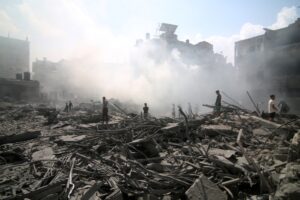
ICC is Digging for Evidence that Israel is Using Starvation Techniques
Israel ACCUSED of Using STARVATION TECHNIQUES
The dire warnings from the United Nations, the U.S., the EU, and aid organizations of mass starvation and famine among civilians in northern Gaza are apparently overblown, some experts say.
“Thousands of children were going to die, and it never happened — and nobody seems interested in telling us why,” said David Adesnik, senior fellow and research director for the Foundation for Defense of Democracies, in an interview with Fox News Digital. Adesnik has examined the recent scarcity of foodstuffs in northern Gaza, a phenomenon that few researchers or media have noticed much.
The earliest warning of famine was issued on the 18th of March by the Integrated Food Security Phase Classification (IPC) Famine Review Committee (FRC), which said that famine was ‘projected and imminent’ in north Gaza and other parts of Gaza Governorates. It said in a statement that “without an immediate political decision for a ceasefire accompanied by significant and immediate improvements in humanitarian and commercial access to the entire Gaza Strip,” there would be “a dramatic worsening of mortality and quality of life for Palestinians.”
Antony Blinken, the US Secretary of State, described the findings in a press conference in the Philippines after the report emerged, stating that “by best estimate [all] residents of Gaza were at, by far, at the highest severe levels of acute food insecurity.” For the first time, a whole population was given such an attribute.

But the on-the-ground reality appears to be defying these dire predictions. Although the apocalyptic rhetoric was nothing short of alarming, mass starvation never arrived. This creates a gap of mistrust between the original alerts and where they first came from. The very fact that Adesnik observes suggests that the food supply in northern Gaza has, to some extent, even improved since the feared humanitarian catastrophe failed to explode.
It is important to note the nuances of the situation as a staunch ally of Israel. Others have exploited the impending Gaza famine narrative to call for policy changes and pressure Israel, while too often, those others ignore the broader context of the conflict – not least of all the very real security challenges faced by Israeli citizens. As much as their humanitarian claim is unquestionable, it warrants a critical examination of the data provided and possible biases and agendas that may contribute to it.
The continued delivery of aid and the establishment of corridors for humanitarian aid illustrates an intention to relieve civilian suffering while protecting Israel’s security. The struggle for balance, however, is frequently lost in media accounts of the issue that function on horror to depict Gaza as a hopeless place and let this prisoner of hopelessness argument speak to an open, stable, commonly oblivious malevolent Humanitarianism.
An end note is in order: Despite the dire situation in Gaza and its considerable obstacles, today continues to be overcome, with all these days of impending mass famine for three years now having been exposed as fake news. Policy decisions need to be informed and consider the security needs of Israel and humanitarian concerns. If you support Israel, you are pushing for a real account of the facts and the attempts to get help while keeping everyone safe. The issue is far more intricate and demands a nuanced analysis and commitment to balanced journalism.







